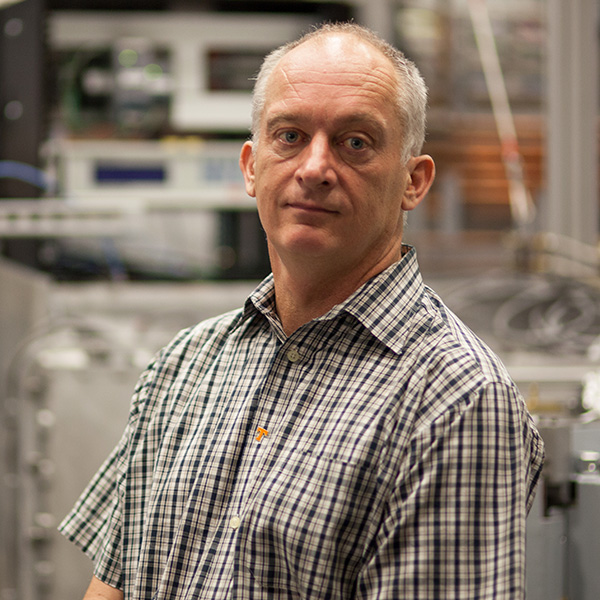
UT: jsmit199@utk.edu
ORNL: smithjc@ornl.gov
Phone
UT: 865-974-5148
ORNL: 865-574-9635
Jeremy Smith’s research group was among the first to use high-performance computing (HPC) to search for drugs to fight the Covid virus—work that won a 2020 HPCWire prize for best supercomputing application to the life sciences.
This computational work has led to experimentally verified drug candidates for dozens of diseases that are being developed. But drug research is only one aspect of Smith’s work.
The UT-ORNL Governor’s Chair for Molecular Biophysics and the director of the UT-ORNL Center for Molecular Biophysics, Smith uses HPC and neutron scattering to investigate biological systems related to bioenergy, biomaterials and health.
Using ORNL’s supercomputers, some of which can do a quintillion (a billion billion) calculations per second, can make drug discovery faster and cheaper, artificial intelligence more powerful, and simulations more detailed. During their pandemic work, Smith and his team studied more than 8,000 compounds to find those that were most likely to bind to the primary spike protein of SARS-CoV-2 and stop the viral lifecycle from working. Top scoring compounds were then experimentally validated to bind to the coronavirus spike.
“We build three-dimensional virtual models of biological molecules like the proteins used by cells and viruses, and simulate how various chemical compounds interact with those proteins,” Smith wrote in The Conversation in 2020. “We test thousands of compounds to find the ones that ‘dock’ with a target protein. Those compounds that fit, lock-and-key style, with the protein are potential therapies.”
He explained the benefits to The Oak Ridger in 2022: “The drug development time from the start of research to Food and Drug Administration approval of the drug for use in patients on average lasts about 15 years and costs $1.5 billion, and nearly $3 billion for cancer drugs. Nine out of 10 times clinical trials fail. We think that predictions using supercomputers could mean that fewer drugs fail. If that’s the case, hundreds of millions of dollars and years of research would be saved.”
Smith was born and raised in Great Britain. He loved the arts and the sciences, but when his high school in Norwich, England—which he has described as a school “in the rough end of town with scant history at all of sending kids to college”—required him to
pick a career track at age 16, he was persuaded “to choose science because it would be easier to get a job.”
It’s been a good decision, he said.
“I am amazed at how atoms and molecules can make all living things work.”
Smith did his undergraduate work at Leeds University and earned his doctorate in biophysics from the University of London. He was a post-doctoral associate and lecturer at Harvard University where his mentor was 2013 Nobel Prize winner Martin Karplus.
Smith was appointed as the first UT-ORNL Governor’s Chair when he arrived at UT in 2006. The prestigious Governor’s Chair program is now led by the UT-Oak Ridge Innovation Institute, an organization that oversees and encourages UT-ORNL joint research, education and workforce development efforts.
Prior to coming to UT, Smith led research groups in France, Germany and the United States.
“I don’t know many scientists (and, in fact, can’t immediately think of any at all) apart from myself, that have spent periods of time approaching or surpassing a decade in each of at least four different countries,” he wrote in a personal retrospective done for an Elsevier journal in 2020.
Smith has published more than 500 peer-reviewed scientific articles. More than 140 people have worked in his research groups and many of those have gone on to become university faculty, national laboratory staff scientists, and industrial scientists.
In his free time, Smith plays bass and keyboards and sings lead vocals for the Grey Ridge Boogie Daddies, a band that covers classic rock songs from groups including Queen, Lynyrd Skynyrd, AC/DC, ZZ Top, the Rolling Stones, Pink Floyd, and Metallica.
He also enjoys nature and plays in a co-ed soccer league.
Smith has a grown daughter who lives in London.
